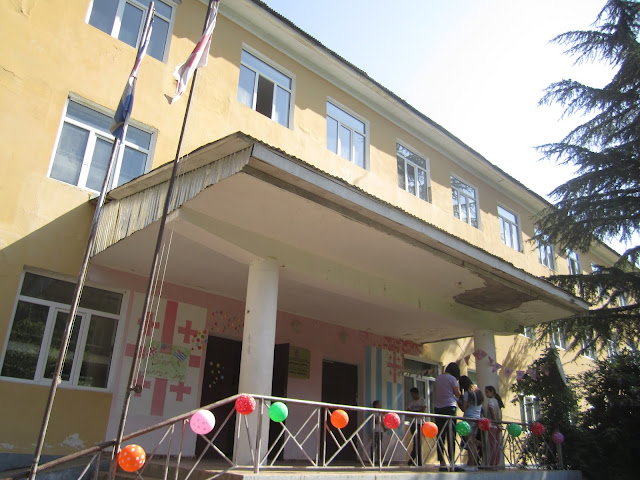 |
| October in Jalabashvilebi: Summer ended late but suddenly. |
There are two words for "season" in Georgian, and I want you to know that I know them both, sometimes. As I sit here shivering in two wool sweaters I still vividly remember packing away my winter clothes, how did summer pass so quickly?
 |
| Mariam & Anano, Kvishkheti in early June |
One thing that I've really enjoyed here is experiencing seasons. Northern California really just has the more fog and less fog seasons, and sometimes not even that, New Orleans' hurricane season and snoball season and Mardi Gras season and festival season were mostly lovely, monsoon season in Thailand less so. Here, for the first time, I am experiencing the kinds of seasons that I've seen in movies and read about for my whole life. A cool spring, and then green and flowers, then a hot beautiful summer, then a too hot September, and then suddenly it's fall and leaves are changing color and petchis are roaring and it's cold. I thought it would be best to write this post before I experience winter, because my feelings will probably be less enthusiastic.
 |
| May in Bublisitkhe. |
 |
| Ice-cream walks with Diana, nowhere, Shuakhevi, July. |
Studying a language in its native country for longer than a few months is a wonderful experience. I studied abroad in college but for shorter periods of time, and unfortunately with less commitment to studying and understanding the people I lived with. Here, whether I've matured or just have fewer options for distraction, I study for an hour every day and hang out in the teacher's lounge and spend time with my family, and keep learning (and sometimes I look at my phone and don't learn as much). One of my favorite things that I've noticed about language learning and time here is that it slowly teaches you the words you need to know, as you need to know them. Unfortunately, the word of this season may be umbrella. During pre-service training (PST), I struggled to remember certain important words - cheese, grapes, job. When I got to site, it was watermelon, desk, the name of the village I might live in. Soon it'll be snow and frost. To combat this difficulty, I study. I have flashcards and verb charts and a notebook for new words and all of that fun stuff, but really time does the job best.
 |
| I got here in April, but it was still winter. Datchi in Kvishkheti. |
 |
| Picking cherries with Datchi, Kvishkheti, May. |
Our textbook has a giant list of food words, and I made a flashcard for each of them, but the ones that I never eat, I never really learn. There's still one in the pile for "dried, hardened bread a la crouton," because I have been fortunate enough not to encounter it yet in the non-book world. Instead, I learn them at the beginning of the seasons, when I go out to the garden or field with the family and try to understand what they're telling me to pick or when my host sister is still excited about watermelon, or grapes, and comes up to my room to tell me to come downstairs and eat some with the family. I never say no to a fruit invitation.
 |
| October grapes in Kvishkheti |
 |
| Roadside fig, Diana's hand, September in Mosiashvilebi |
My persimmon flashcard that's been floating around for months is finally approaching the end (I have a system that involves getting a flashcard right 6 times before I cross out the word on it and use it again). "Khurma," (ხურმა) a delicious word for a fruit I don't really like that much. You can also call them "karalioki," (კარალიოკი) but I think that's Russian and I don't like that word much. In a non-coincidence, the persimmons outside of my bedroom window are ripening, and the first slightly-greenish ones have just reached the bazaar. By the time they are fully ripe I will never forget the word for persimmon, as I will remember cherry, plum, strawberry, watermelon, hazelnut, fig, grape, corn, and pumpkin, in that order. I'm looking forward to pomegranate and chestnut.
 |
| Red leaves coming toward Dandalo, September |


















































